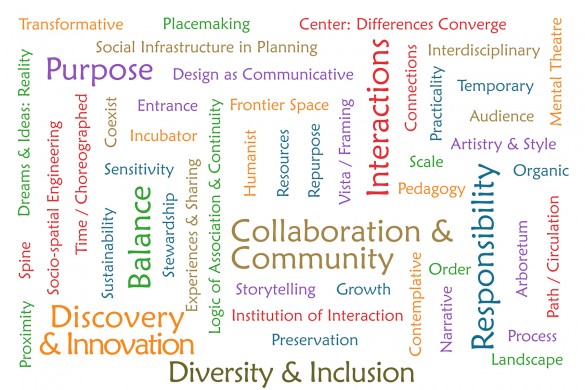
Vanderbilt University’s land use plan is entering its second year with a full slate of activities and a new 19-member faculty advisory committee to engage the Vanderbilt community in the design and development of the campus. The plan, which has been named FutureVU, is one of Chancellor Nicholas S. Zeppos’ primary initiatives.

To help guide the overall process, Zeppos has appointed a faculty advisory committee representing all areas of the university. Engineering faculty members serving on the committee are Clare McCabe, professor of chemical and biomolecular engineering, and Craig Philip, research professor of civil and environmental engineering.
The committee met for the first time Sept. 22 for a daylong planning session. The interactive session included an overview of FutureVU, a review of the process to date, its overarching principles, options proposed thus far, and group activities to engage on specific topics and themes.

Eric Kopstain, vice chancellor for administration, is leading the planning process in partnership with New Haven, Connecticut, firm Pelli Clarke Pelli Architects. The planning team has developed key principles to guide the process based on feedback and input from hundreds of stakeholders. They include the following:
- Vanderbilt is an internationally recognized research university with strong partnerships among its schools.
- Vanderbilt believes that diversity and inclusion are integral to its mission.
- Vanderbilt is a community of neighborhoods.
- Vanderbilt is a historic, multi-layered and vigorous campus.
- Vanderbilt is a university that resides in a unique and distinctive park setting.
- Vanderbilt is a walkable and sustainable campus.
- Vanderbilt is a citizen of Nashville and the region.
Activities slated for this fall include a town hall meeting on transportation Oct. 28; multiple discussion opportunities with students, faculty and staff; and possible additional town halls and events around topics of interest. Zeppos and Kopstain also will engage with elected officials, community leaders and the private sector to ensure Vanderbilt’s significant midtown footprint is developed in partnership with its neighbors and in such a way that it can serve as an incubator to test innovative solutions to design and transit that can be used throughout the city.
Learn more about FutureVU on the chancellor’s website, vu.edu/futurevu.
Media Inquiries:
Melanie Moran, (615) 322-NEWS
melanie.moran@vanderbilt.edu